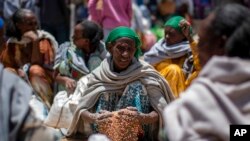The U.N, Office for the Coordination of Humanitarian Affairs, OCHA, warns it may be forced to end its humanitarian operation in northern Ethiopia’s embattled Tigray province because supplies are running out.
Intense fighting in northern Ethiopia has prevented aid from getting through to millions of destitute people in Tigray since mid-December.
OCHA spokesman Jens Laerke says U.N. and private aid agencies already have been forced to scale back operations because of severe shortages of supplies, fuel and cash.
“Organizations have warned that operations could cease completely by the end of February,” said Laerke. "Nutrition supplies for supplementary feeding and treatment of severe acute malnutrition have already run out.”
The World Food Program says 13 percent of Tigrayan children under the age of five, and half of all pregnant and breastfeeding women are malnourished, a condition that increases the risk of infection and death.
Laerke says international aid agencies operating in Tigray report their last fuel stocks were depleted on January 24. Since then, he says aid workers have been delivering the little remaining humanitarian supplies and services on foot, where possible.
“We have seen in recent days — of course, the U.N. Humanitarian Air Service has picked up again and they are delivering. But you cannot deliver by plane at all, the kind of volumes of aid that is clearly needed in this situation,” said Laerke.
War between Ethiopian government forces and the Tigray People’s Liberation Front broke out in November 2020. Since then, the conflict has spread to the neighboring Amhara and Afar regions, displacing hundreds of thousands, and pushing up rates of hunger and malnutrition.
Unlike the situation in Tigray, Laerke says aid agencies can scale up assistance in accessible parts of Amhara and Afar. He says food has been distributed to more than half-a-million people in Amhara during the past week, and nearly 380,000 people in Afar have been reached in an ongoing round of food distribution.





